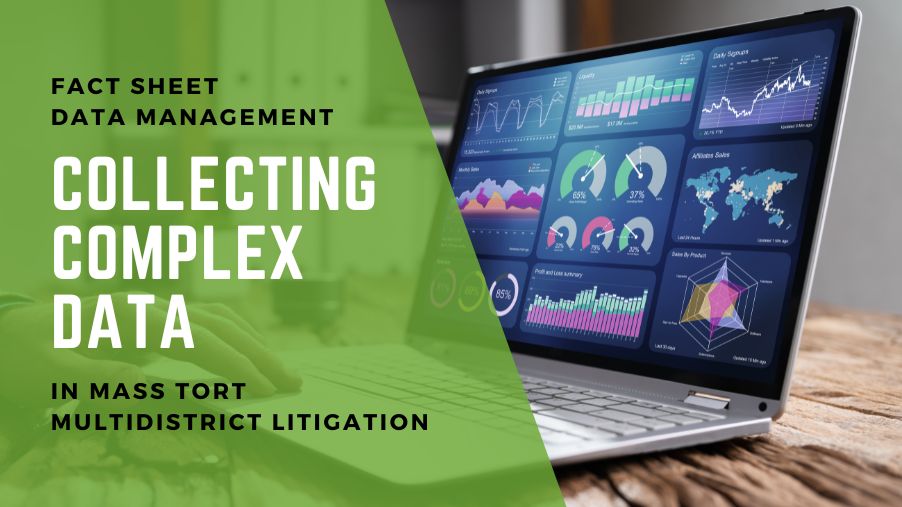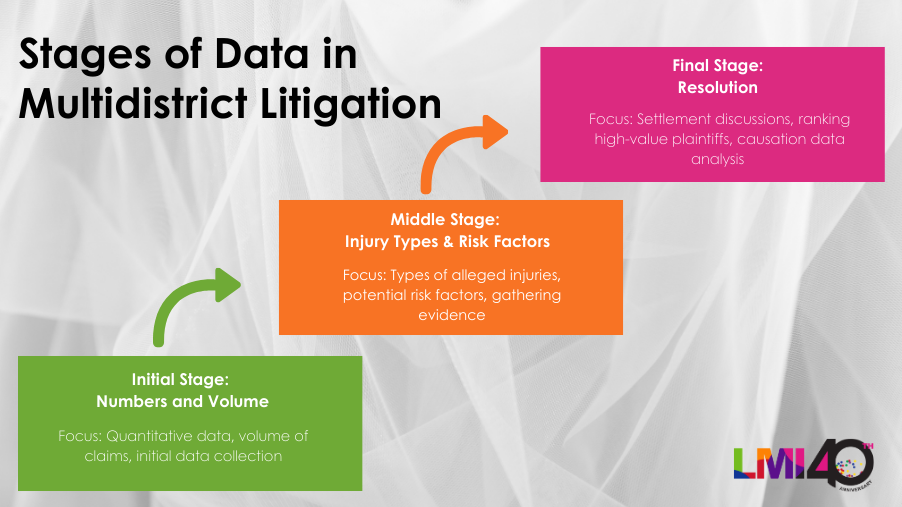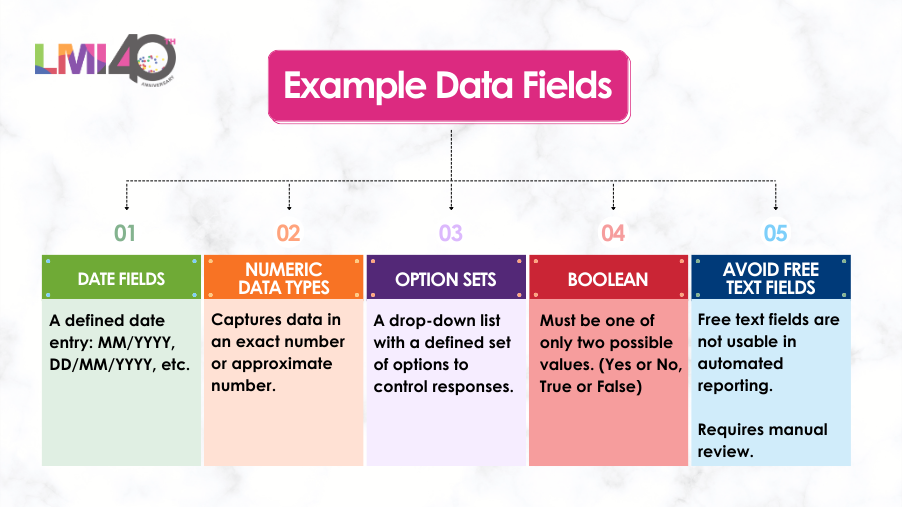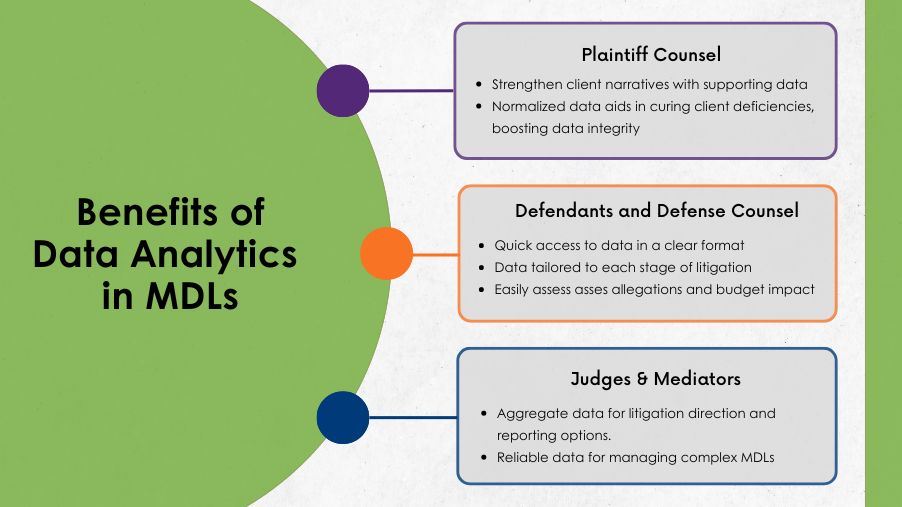
Data integrity is critical in navigating the complexities of injury-related litigation. The accuracy and reliability of analytics are paramount in shaping case strategies, influencing outcomes, and ultimately reaching successful matter resolution.
In LMI’s 40 years of experience, properly formatting data at the outset of litigation produces powerful analytics while keeping processes streamlined for efficiency.
Federal Rules of Civil Procedure (FRCP) 16.1: Increasing Focus on Verified Data in Multidistrict Litigation
Following years of debate, the Judicial Conference’s Advisory Committee on Civil Rules released its preliminary draft of Rule 16.1, the first formal rule aimed at improving efficiency in the management of multidistrict litigation. While the draft language released by the Committee will likely become law, the draft must be reviewed by the Committee on Rules of Practice and Procedure, the judiciary, and Congress. If approved, the Rule will take effect December 1, 2025.
What is Data in Litigation?
Data in litigation is the information about the litigation that will help move the dial toward resolution—different pieces of data matter to different people involved in the litigation throughout the various stages.
[See: 7 Stages of Product Liability Litigation]

Parties are typically concerned about numbers and volume at the outset of the litigation. As the litigation progresses, the focus transitions to causation, the types of alleged injuries, and potential risk factors. If a litigation involves more than one defendant, the focus can shift to the timeframes of liability for each defendant. As the litigation moves closer to resolution and settlement discussions begin, ranking high-value plaintiffs versus those with fewer causation data can help shape the parameters.
Court Approved, Standardizing Forms for Collecting Data in Multidistrict Litigation
- Census registries
- Plaintiff Profile Forms
- Plaintiff Fact Sheets
- Defense Fact Sheets
Example Data Points in Mass Tort Litigation
- Number of filed and unfiled claims
- Number of plaintiffs
- Demographics
- Age brackets
- Injury types
- Injury severity
Data Modeling in Product Liability Litigation
Data modeling is the process of creating a conceptual representation of the structure and relationships within a litigation dataset. It involves defining how data will be captured, organized, displayed, stored, and accessed within a system or platform.
Data modeling helps ensure data accuracy, consistency, and efficiency in the data retrieval and management phase of the discovery process.
When collecting data from claimants or plaintiffs, the data needs to be normalized for it to be useful to any party. This means the data collection process should have a structure around how each piece is recorded to reduce data redundancy and improve data integrity. The structure behind the scenes is data modeling. This approach will allow you to view your data in powerful reports with analytics and trends to shape and support your strategy. - Megan Pizor, General Counsel & Chief Data Officer, LMI
Best Practices to Normalize Litigation Data
There is a plethora of data types in litigation and how you approach collecting the data is a vital step to consider in the investigation phase of litigation. Approaching this phase with good insight and good data will allow parties to make informed decisions that will help save time and money.
Regardless of the method used to collect the data, below are example data fields LMI analysts recommend implementing in your data collection process.

Example Data Fields for Reporting
- Date Fields
A field type that uses a defined date entry. (MM/YYYY, DD/MM/YYYY, etc.) - Numeric Data Types
A field type that captures data in an exact number or approximate number. - Option Sets
A field type that uses a drop-down list with a defined set of options to control responses. - Boolean
A field type that must be one of only two possible values. (Yes or No, True or False) - Avoid Free Text Fields Where Possible
Free text fields are not usable in automated reporting. This information would require manual review and does not guarantee streamlined responses.
Benefits of Data Analytics in Early Stages of Multidistrict Litigation Census Registries & Fact Sheets
All parties involved in the litigation are interested in what the data is going to provide, but different aspects will be important to each.
The data collected in registry forms and fact sheets is important to all, but everyone is looking at the topic slightly differently and how it will impact them and their role. These deliverables are powerful when the data is consistent to produce actionable insights. - Megan Pizor

Benefits of Data Analytics to Plaintiff Counsel
It is important for plaintiff counsel to accurately describe their client stories. By maintaining areas of normalized data, supporting reporting can strengthen the narrative.
Whether utilizing a fillable PDF or a centralized data exchange platform to collect the data, plaintiff counsel maintain the ability to cure their clients' deficiencies to increase data integrity.
Benefits of Data Analytics to Defendants and Defense Counsel
Defendants and defense counsel need to receive data quickly and understand how and in what format they will receive the data to filter the information to what matters most at each stage of litigation.
At the outset, they may be looking at the overall allegation metrics and the potential impact to their legal budget.
Benefits of Data Analytics to Judges & Mediators
Judges and mediators want the aggregate data to understand where the litigation is heading. They want to understand the reporting capabilities available to them.
Reliable data is very important in the management of complex multidistrict litigation.
Preparing for Data Collection in Mass Tort MDLs
LMI has 40 years of extensive experience in injury-related multidistrict litigations, managing complex data and all medical aspects of discovery. Our team of legal professionals and data analysts can work with all parties to develop questionnaires and fact sheets to meet the specific requirements of the case which can yield powerful analytics early in the process.
